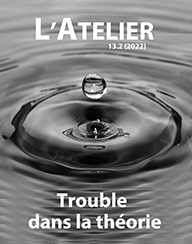The Ethics of the Ordinary: Ordinary Language Philosophy envisaged through Raynor Winn’s The Salt Path
Abstract
This article puts into dialogue various theoretical texts characteristic of Ordinary Language Philosophy (OLP) and a contemporary, largely autobiographical narrative that relates a journey on foot, at the level of other hikers, natural elements and other ordinary actants of a degraded social environment. It seeks to show how literary narrative engages attention to the ordinary and sharpens readers' perceptions. Based on a reading of Wittgenstein, Diamond, Murdoch, Moi, Lovibond, but also Le Blanc, Pelluchon, Laugier, Ferrarese, or Citton and Morizot, it proposes to look at the modalities of attention to the invisible, then to the visible, in order to identify the emergence of a particularist ethics that sets out to define what is right by starting to determine what counts, what is important, in other words what matters.
Keywords: attention – inquiry – ethics – importance – invisible – OLP – ordinary – perception – visible – what matters
Downloads
Published
Issue
Section
License
- Work submitted for publication must be original, previously unpublished, and not under consideration for publication elsewhere. If previously published figures, tables, or parts of text are to be included, the copyright-holder's permission must have been obtained prior to submission.
- Authors of accepted manuscripts will assign to L'Atelier the right to electronically distribute their article, or publish it in any form (Internet, CD ROM, printed copy) but authors will retain copyright and, after the article has appeared in L'Atelier, authors may republish their text (in print and/or electronic form) as long as they clearly acknowledge L'Atelier as the original publisher.


